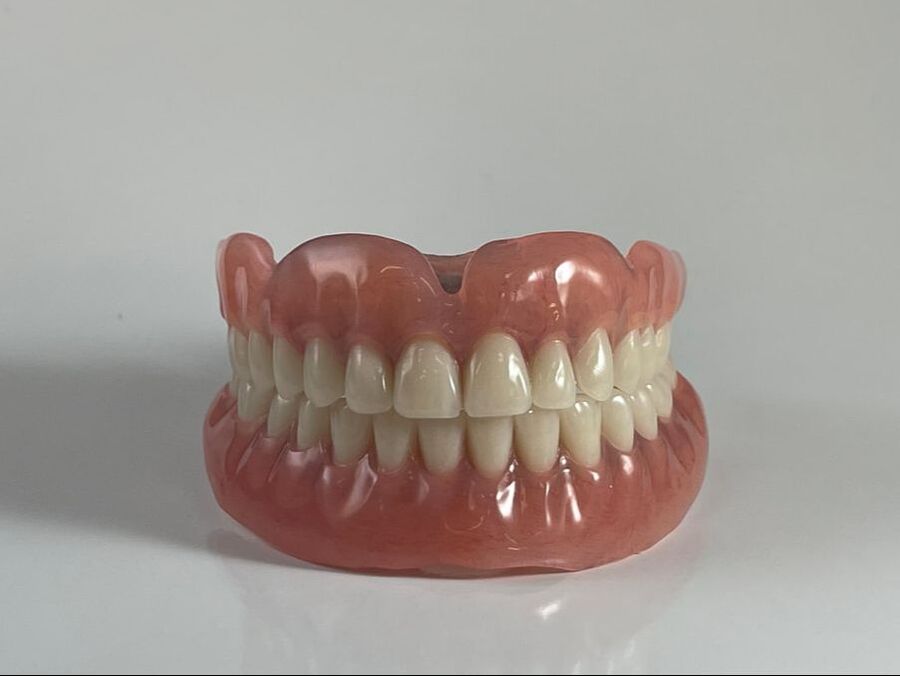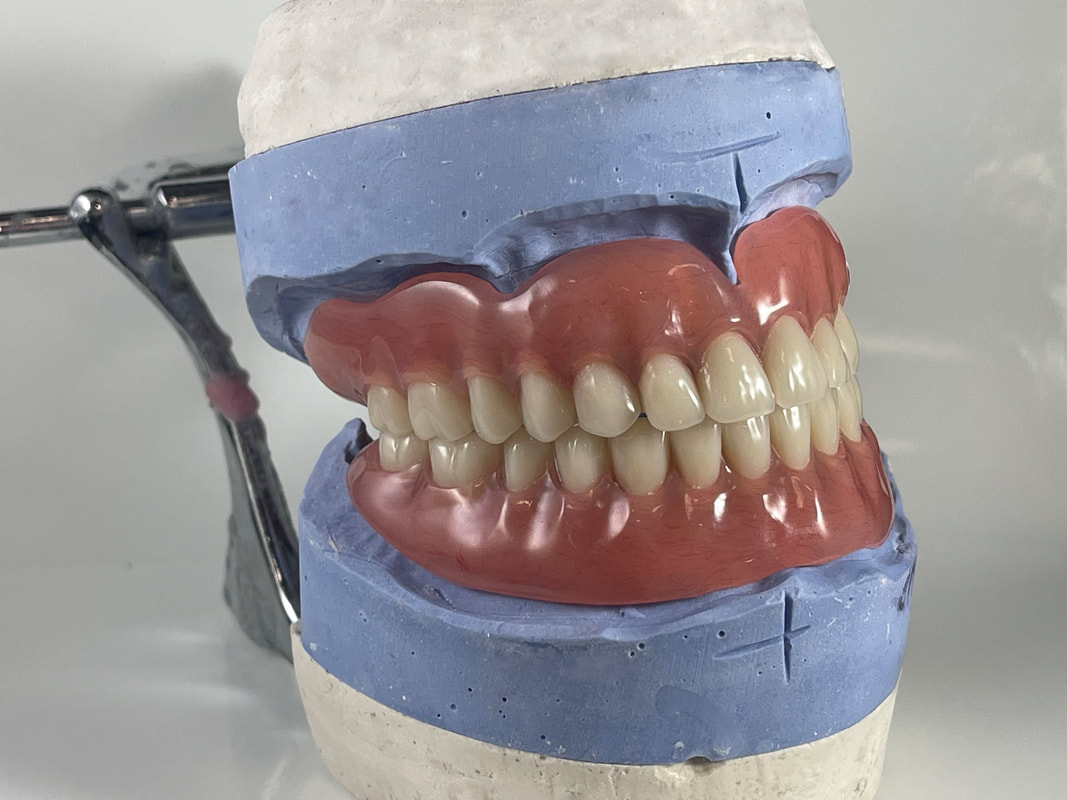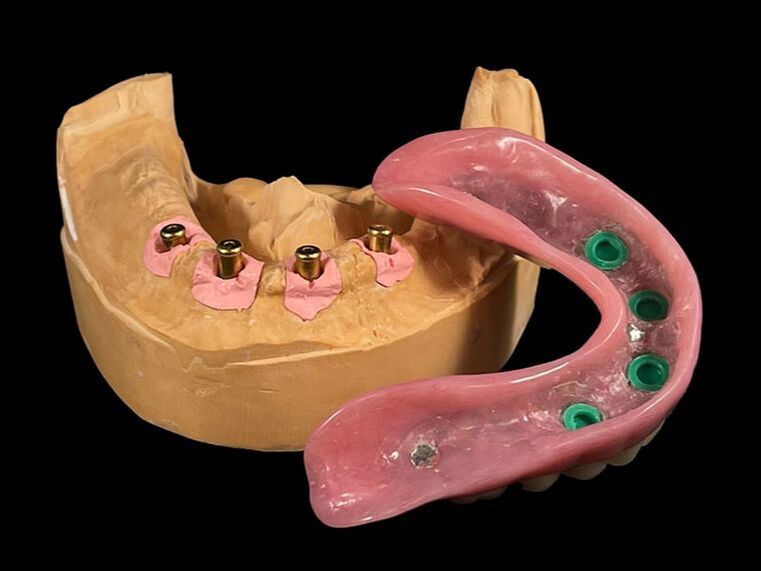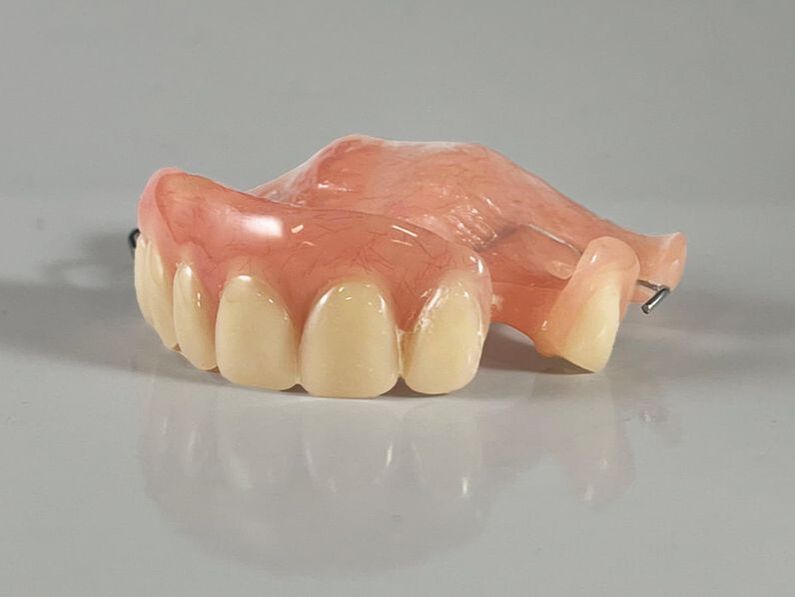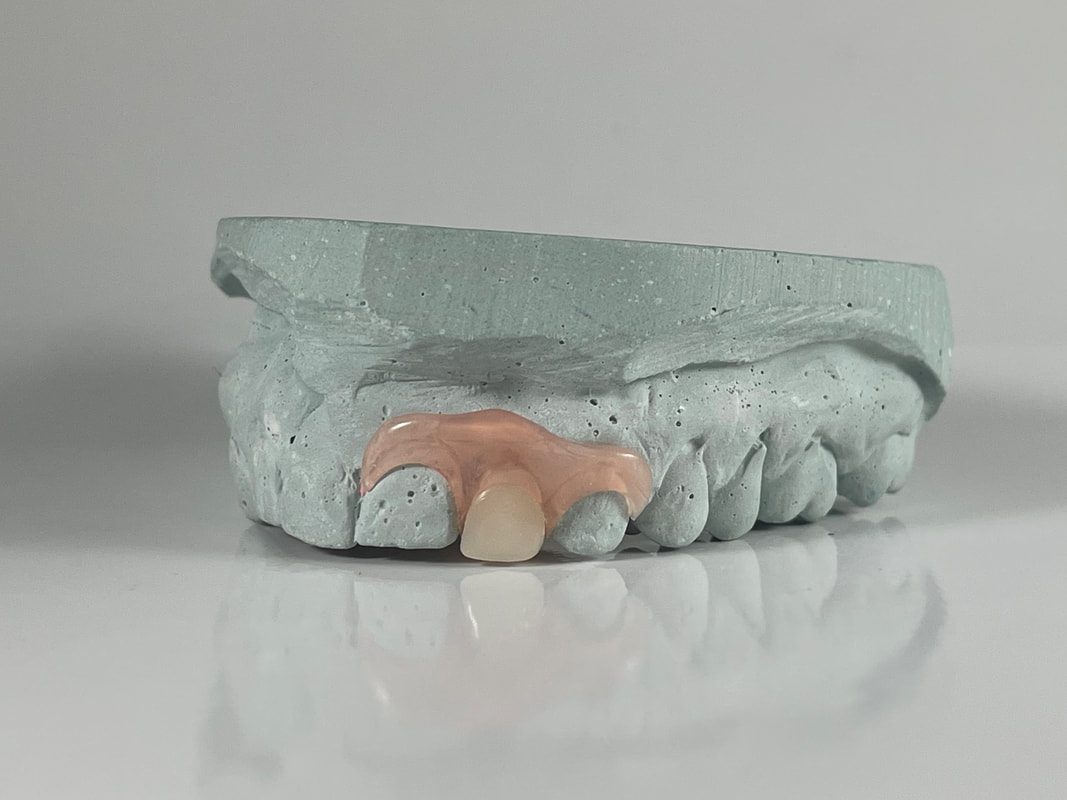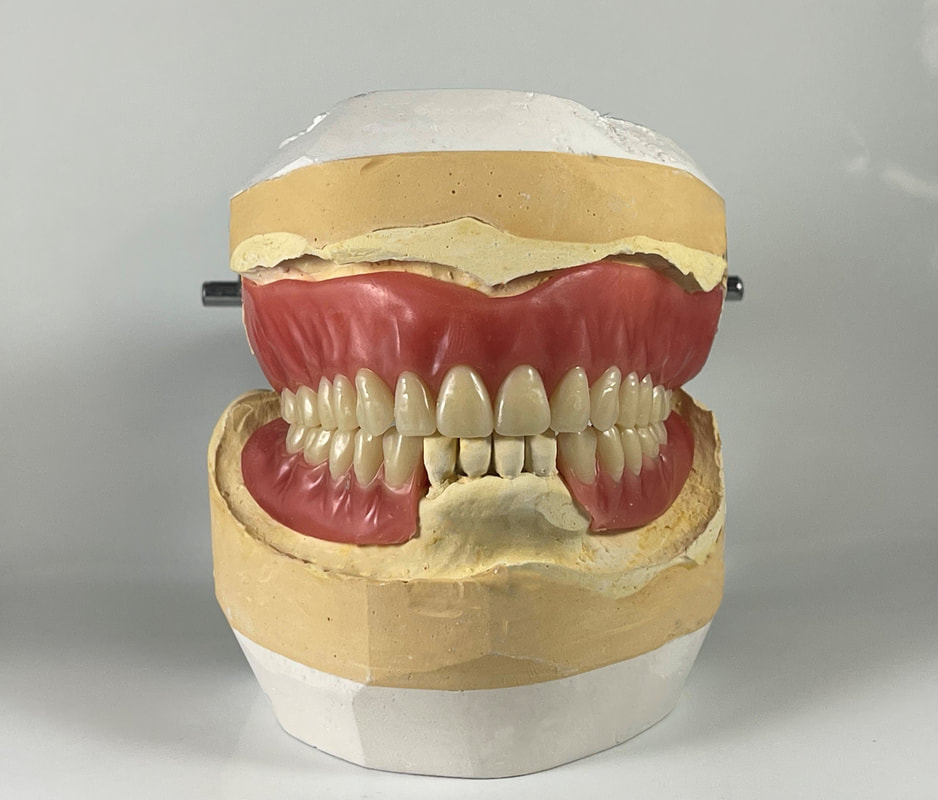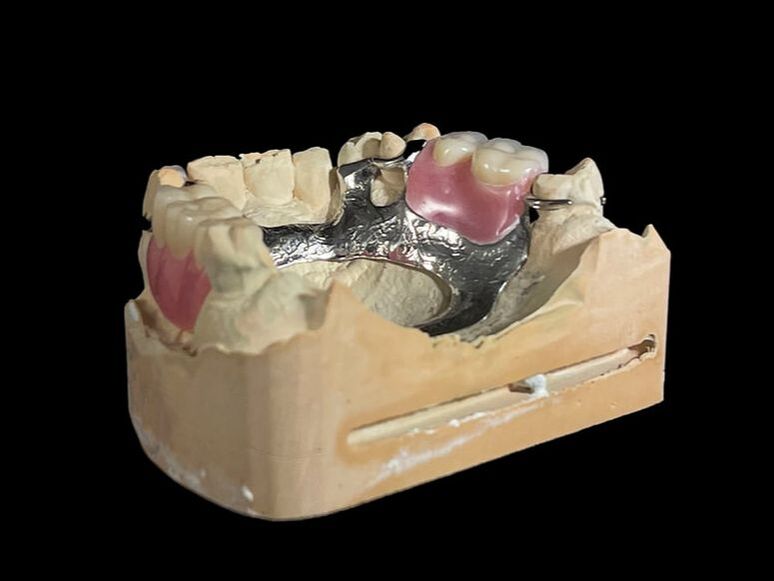There are many types of dentures that can be either fixed or removable. Dental dentures can be designed to cover a full arch or a partial arch. Complete dentures are used when a patient is fully edentulous on either or both arches. On the other hand, partial dentures offer a fully removable solution for partial tooth loss. The Dental Lab makes multiple types of dentures and partials to best suit your patients’ needs. Complete Removable DenturesComplete dentures are durable, long-lasting, and highly aesthetic. The upper maxillary denture covers the roof of the mouth, while the lower mandibular device rests on the gums and bones of the the lower dental ridge. Removable dentures are kept in place by the cheek muscles, tongue, and saliva. An adhesive may be used for extra security. With proper maintenance and cleaning, removable dentures can last up to 7 years. They are commonly made from acrylic resin and the material has incredible strength, durability, and biocompatibility. Implant-Retained DenturesImplant-retained dentures consist of complete dentures secured with dental implants that have been surgically placed in the jawbone. Some implant-supported dentures can be removed by the wearer, while others must be removed by a dental professional. Locator overdentures, for example, use a snap-in method to secure the denture, but easily be removed by the wearer. On the other hand, fixed hybrid dentures, which attach a denture to an implant bar need to be removed by a dentist. Some common methods for securing non-removable implant-retained dentures include the all-on-four and all-on-x procedures. The all-on-four technique places 4 dental implants in specific sections of the dental arch . The sinus cavities in the upper and teh nerve in the lower are avoided, eliminating the need for bone-grafting most of the time. When less or more implants are needed, the procedure is referred to as an all-on-x. Digital DenturesDigital dentures are fabricated with dental cad/cam (Computer-aided design and computer-aided manufacturing) to create precision-made 3D-printed prostheses. Based on captured digital dental impressions and records, a dental technician uses computer software to create and customize dentures virtually. The digital designs are then brought to fruition through additive 3D-printing or subtractive machine-milling. Compared to traditional removable dentures, 3D-printed dentures are less labor-intensive and they reduce the number of office visits. 3D dentures improve the workflow of the dentist by making it flexible, archivable, and repeatable with dental technology. The accuracy of the dentures result in fewer try-in and adjustment stages, which means less chair time overall. Partial DenturesPartial dentures are a removable solution for replacing several missing teeth, but not the entire arch. Some healthy natural teeth must remain as they are used for support. They are designed to rest on the gums while being secured in place by the remaining natural teeth. Metal components may be used for extra stability. Acrylic Partial DenturesPartial acrylic dentures consist of denture teeth set in an acrylic resin base plate. They get support by sitting on the dental ridges, but wrought wire components can be incorporated to grip the surrounding natural teeth. The malleable acrylic resin material allows for easy repair and relines. Additional teeth can be added to the material in the future, if needed. Cast Metal Partial DenturePartial dentures with cast metal frameworks rest between the gaps of the teeth and hold onto existing teeth with metal clasps. The metal framework is attached to acrylic resin that is set with artificial teeth. The metal clasps offer high retention and restored function for the wearer. Compared to acrylic resin, metal frame partial dentures are less bulky and lighter in terms of weight. The smaller size allows patients to adjust more easily because they don’t take up as much room on the roof of the mouth. They are also made up of nickel-free alloys that are resistant to plaque buildup. Flexible Partial DenturesFlexible partial dentures are made from softer, more malleable materials that allow for greater flexibility than traditional dentures. They are typically made with thermoplastic resin and a nylon-like injected base material for increased flexibility, biocompatibility, and durability. They are more comfortable to wear, chew, and eat in. Thermoplastic materials can be molded and customized for each individual. The addition of nylon adds pliability and can effectively secure the dentures without causing discomfort. In addition, flexible partial dentures are less likely to cause irritation because they present no risk of allergic reaction and contain no BPAs. Moreover, partial flexible denture materials are stronger than traditional materials. In turn, the dentures can be thin, lightweight, and are less likely to break when dropped. Patients also benefit from the high aesthetics flexible partial dentures offer. They are a metal-free solution that uses undercuts in the alveolar ridge for additional stability. The material is also translucent and tissue-like in appearance, which provides patients with the most natural look. It’s also stain and odor resistant, which helps with maintenance and cleaning. However, teeth cannot be added to a flexible partial denture once the final prosthesis is finished. Digital Partial DenturesDigital partial dentures are partial dentures that are fabricated with a digital workflow. Just like with complete digital dentures, the partials result in high levels of accuracy thanks to dental cad/cam technology. Using computer-powered machine milling, digital partial dentures are carved out with precision. Digital denture partials can be either all-acrylic or flexible. Sometimes, they are made with thermoplastic materials, such as Duraflex, to allow for malleability and pliability. Both options can be metal-free and provide ideal adaptation to both hard and soft tissues. Dental Flipper and Dental NesbitDental flippers and dental nesbits are removable acrylic solutions that usually replace a single tooth. A dental flipper consists of a retainer, wrought-wire clasps, and an artificial tooth. The retainer sits on the roof of the mouth and the tooth rests between the existing natural teeth. On the other hand, a dental nesbit is a partial denture that rests on the gum tissue. The nesbit uses artificial gum-looking claps for support. Denture Wax Try-InA denture wax try-in is a preliminary model of the final prosthesis made in wax. The teeth are set in gum-colored wax and allow the patient to preview their smile before the final prosthesis is made. It is used by the patient and dentist to achieve the desired appearance and fit of the finished denture., often times called a, "Dress rehearsal." Denture Repairs, Denture Relines, and Denture RebaseA denture repair lab fixes broken dentures, duplicates dentures, replaces teeth, and laser welds. Repair time depends on the extent of the damage to the denture. However, some denture repair labs are specialized to offer same-day repairs. In cases where a denture needs to be reshaped or realigned, a denture reline is used to restore an existing denture to form, fit, and function. During this procedure, the tissue surface of the denture is reshaped to better fit the gums, increase stability, and increase the patient’s chewing ability. Another form of denture repair is a rebase. A dental rebase is indicated when the artificial teeth are in good condition, but the base plate is in poor condition. The base plate may require a rebase if it is thin, weakened, or cracked. Denture Lab Near MeLooking for local dental labs that specialize in dental and denture services? The Dental Lab is a leading denture dental lab in the United States. We deliver all over the nation with our fast and reliable shipping services, making us a dental laboratory near you--no matter where you are. Our denture lab provides the highest quality solutions for your edentulous patients to meet their aesthetic and functional needs. The Dental Lab carries a wide selection of dentures and partials with or without metal frames, allowing you to choose the best product suitable. In addition, we offer multiple brands of flexible partial dentures, including Valplast, SnowRock, and Duraflex DigiFlex. Paired with our outstanding shipping providers, we are a choice lab for dental dentures near you. Contact us today to get started on your next denture case. Sources: The Pros and Cons of Thermoplastic Partial Dentures Everything You Need to Know About Partial Dentures Lifelike Digital Dentures at the Click of a Button What Are Flexible Partial Dentures? Flexible Dentures: Benefits and Costs What is a Flipper Tooth? Keywords:
Dental labs for dentures, acrylic partial dentures, cast metal partial denture, flexible partial denture, denture lab near me, digital dentures, local dental labs, dental cad cam, denture labs, 3d printed dentures, implant retained dentures, bar overdenture, complete dentures, Dental and denture services, Dental and dentures, dental denture, Dental dentures near me, dental nesbit, denture and implants, denture lab, Denture repair lab, denture wax try in, Fixed hybrid denture, full denture, Full denture implants, Full mouth dentures, full set of dentures, hybrid denture implants, implant retained dentures, Implant supported dentures, Interim partial denture, Locator denture, locator overdenture, Making dentures, Metal frame partial denture, Nesbit partial denture, nesbit tooth, Partial acrylic denture, Partial denture process from start to finish, Partial flexible dentures, Removable dentures, Removable partial denture, Resin based partial denture, resin partial denture, screw in dentures, Traditional dentures, Types of dentures, valplast, all on 4 dental implants, all on x dental implants, Resin based partial denture, resin partial denture, dental dentures, denture and dental, maxillary denture, mandibular device, digital dental impressions
0 Comments
Leave a Reply. |
